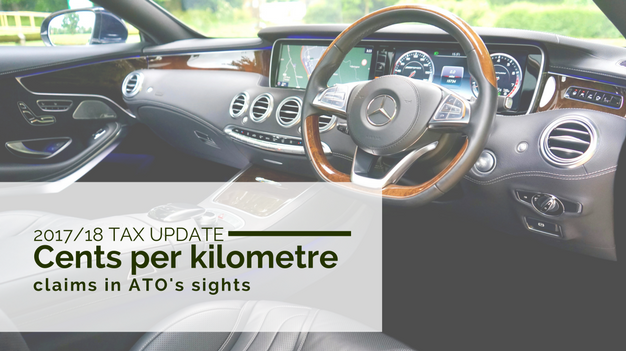In general, the kilometres you travel in your car in the course of business are deductible. To qualify, the kilometres travelled has to be in the course of producing assessable income or travel between workplaces. This does not, however, include travel between your home and workplace which tax law considers private in nature.
Under the current rules, a taxpayer can claim a maximum distance of 5,000 kilometres per year in car expenses without needing to substantiate that claim with receipts. If a taxpayer wants to claim an amount above that 5,000 kilometres per year cap, additional substantiation will be required. Usually, all receipts are required and the amount will then be reduced to take account of private use, calculated using a current log book.
Under the 5,000 kilometre per year cap, deductions are calculated using the ‘cents per kilometre’ method, which allows 66 cents per kilometre up to the maximum distance of 5,000 kilometres. The maximum deduction using the ‘cents per kilometre’ method is therefore $3,300 per year.
While substantiation isn’t technically required for claims below the 5,000 kilometre per year cap, you shouldn’t be tempted to claim the maximum deduction of $3,300 if you did not actually undertake that travel for business! The Australian Taxation Office has recently issued a warning that claims using the cents per kilometre method at or near the $3,300 limit will be subject to ATO review (read: tax audit).
So, what records should you keep if you’re planning to claim car expenses?
While there is no specific requirement to keep records for substantiation of claims using the cents per kilometre method, the number of business kilometres claimed must be based on a reasonable estimate. The idea of “reasonable estimate” hasn’t been clarified in tax law, however, here are some considerations from a practical perspective:
irregular work-related travel would need to be specifically listed down in a written record, and
regular work-related travel (say between two work sites) may be calculated with reference to the number of trips made.
To keep things simple (and to help keep on top of your expenses), it’s worthwhile maintaining a log book of the car travel you are doing even if you don’t technically have to – note down where you are leaving from, the destination, and the purpose of each trip. This will make it easier for you to make a reasonable estimate of the distance travelled when it comes to lodging your income tax return and will assist to substantiate your claim in the event it comes under review by the ATO. Further, although you won’t need to lodge this information with your income tax return if you’re under the 5,000 kilometre per year cap, we recommend retaining the information for five years in the event you are reviewed.
Income tax is complicated! We aim to keep it simple sand safe. As always, if you have any questions or are wondering whether you are entitled to claim car expenses, please do not hesitate to contact us.
[Originally posted on the OakWealth Blog]





